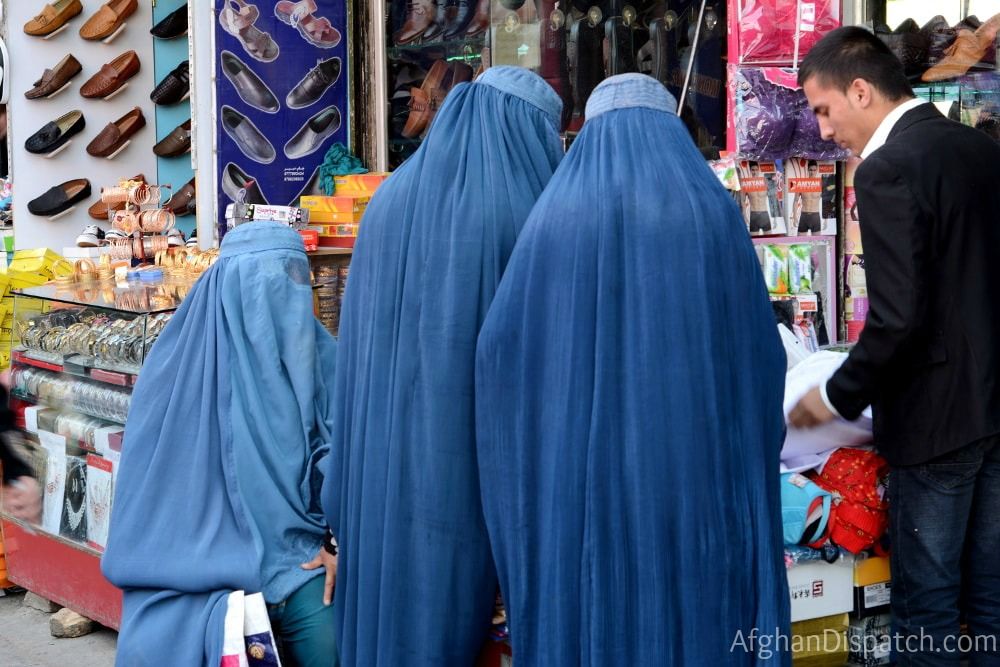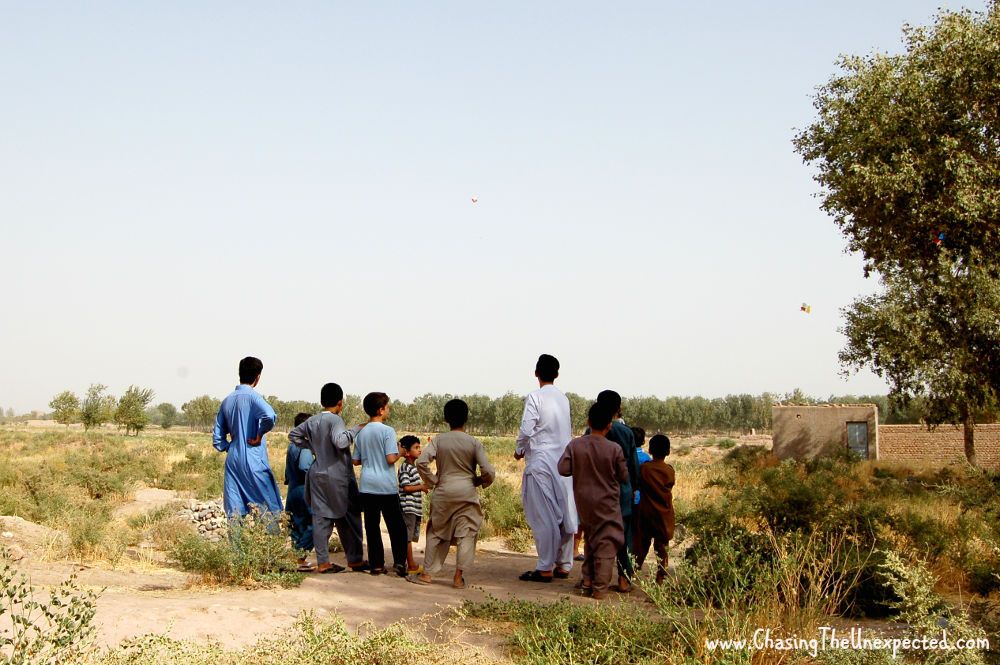“Khosh amadid be Afghanistan, welcome to Afghanistan”, a smiling and polite immigration officer at Kabul airport waved me in beyond the immigration border. We had just got off the plane when I saw my first burqa-clad woman. “Do many still wear it?” I asked my husband, almost fearing his answer. “It’s a long story,” he smirked. For all the travels I had embarked on, this was my first time in a war zone. Women’s travel to Afghanistan is hardly an easy topic to write about, so I hope my experience of living there and trying to blend with a society that’s all but easy to comprehend will help other women to make the right decision, be it either to go or not.
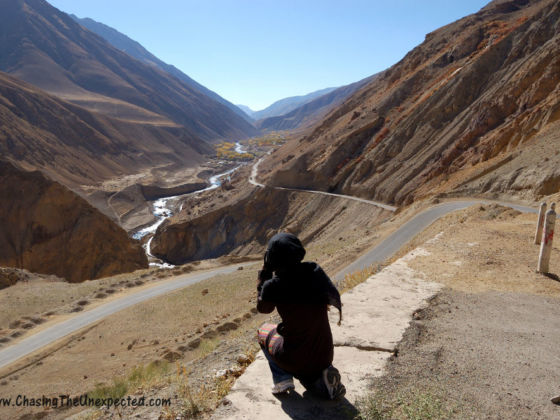

Traveling to (and Living in) Afghanistan as a Western Woman
Women’s travel to Afghanistan, is it such a bad idea?
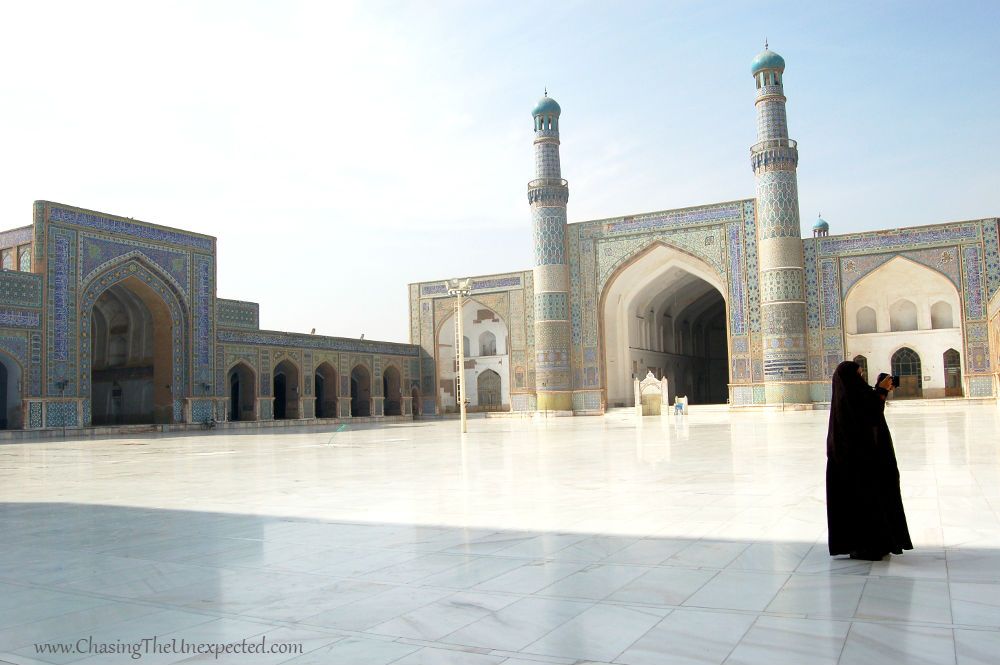
Women’s travel to Afghanistan, all covered but not forgetting to take pictures. Here at Herat Grand Mosque
Shortly after our landing, we rushed off to catch our flight connection to Herat, my husband’s hometown and my first real, palpable experience of Afghanistan. On my first taxi ride from the airport to home, I tried to observe as much as I could. I had wanted to visit Afghanistan for years, and now I was there. From the car window, Herat looked just like a normal city: screaming motorbikes darting past each other, often with three or even four passengers, strictly without a helmet, dim shop lights still on, old-fashioned cars from the ’90s roaming as if in a vintage picture, careless of any street sign (not that there were many). “Now, this feels like Asia,” I thought, recalling Iran’s and India’s traffic.
It’s when my husband asked the taxi driver to briefly stop at a fruit street vendor that I had the first clue of the stiffness in men/women relations: the driver stepped out of the car and wouldn’t get back in until my husband was back, with the sweetest and most succulent fresh figs I had ever tasted.
The first hours arriving home and enjoying tea, nuts, and sweets with the family ran so smoothly that I almost forgot where I was. My very first day in Herat quickly reminded me.
Before leaving the house for our daily shopping, I asked my mother-in-law if my Iranian manteau was an adequate outfit and, after seeing the length, she swiftly approved it. Only to regret her decision half an hour later, when all the shopkeepers at the bazaar started pointing at me, talking to me and about me (still ten minutes later, when my husband passed and heard them ranting about women’s fault on the decline of their social mores). When the next day I wore a chador, I automatically became invisible.
This is how I realized that even though Herat lies only an hour drive from the Iranian border, the dress code is quite different and if you really don’t want to wear the burqa, only a chador or full-length tunic are considered acceptable.
Becoming the perfect Afghan wife

Playing the perfect Afghan wife was, in fact, my strategy to reach where foreigners can’t. Foreign journalists and photographers don’t really have an easy life in Afghanistan. Due to obvious security reasons, they always need a driver and/or a security guard with them, and this is how I knew my trip was going to be different.
Women’s travel to Afghanistan is always something very tricky to consider, especially traveling solo, but my mission was to delve deep into the Afghan society, understand how the Afghan people live, how they organize their work, their leisure time, and the different aspects of daily life, including marriages.
As a matter of fact, my marriage has been truly enlightening and revealing of the local customs and tribal heritage. Even with my very poor Persian, I could understand that the first mullah we approached refused to marry us because my parents weren’t there and he wasn’t sure they would give their blessing. My soon-to-be mother-in-law began shouting at him all sorts of contempt, from accusing him of being corrupt to not perpetuating the real Islam, but nothing worked, not even telling him that I turned eighteen quite a few moons ago. While it’s a possibility that he was actually waiting for some bribe, I wouldn’t rule out the fact that he was probably worried that they actually kidnapped me and he wanted no responsibility in this.
A couple of days and mullahs later, we finally managed to exchange vows. Just when I was thinking the process was nearing the end, I was told that before going to record it in the court, we had a couple more steps. It turned out that we still needed many people to sign and approve our marriage, among which included the so-called “lord of the area.” The what? That’s right, the lord is responsible that everyone in his neighborhood behaves properly. With “properly” mainly meaning according to Islamic principles.
We were welcomed by his son, who let us into a wide garden. We entered an unadorned house where the only decoration was a colorful, ubiquitous carpet. The lord of the area, a pint-sized old man, looked pretty suspicious, especially when he was told I didn’t speak Persian. Nevertheless, he had us sit on his ceremonial carpet, offered us tea and wedding cookies and, eventually, gave us his approval.
Now, my wedding alone was something to note. Forget the long white dress, hours of makeup and hair-dresser, towering cake and the just-married limousine. Our first attempt ended up with me, my wannabe husband, and brother-in-law darting on the streets of Herat on the same shaky motorbike, while the lucky day when we actually got married, we upgraded to a not-so-brand-new Suzuki 1992.
My wedding dress, you wonder? A long, black, shapeless manteau covered with a black chador, just like every other day.
Afghanistan and its women
Afghanistan is notorious for being the world’s most dangerous country for women, and although many of the ladies I met lead a quiet and happy life, it’s easy to notice the different social rules men and women are subject to.
In all of this, my role was a bit of a hybrid. I was a foreigner, but I was married to an Afghan, so to some extent, I was expected to understand what my place was and to abide by the unspoken rules women grow up with, the only problem that I didn’t know those rules.
Lucky for me, however, this blended perfectly with my security strategy. When we went out, I would play the perfect Afghan wife, nodding silently and letting my husband do all the talking so no one would understand my nationality (something he probably missed once we were back in the house), and constantly being by his side. On more than one occasion, my husband did exploit my weak gender to skip some bank and office queues.
As a woman, there were many places where my presence was not welcome. Starting from car repair shops to some hookah bars and restaurants, many are men-only spaces. Likewise, there are places where only women can access, where their husband or father trust they won’t run the risk of being harassed or any stranger seeing their hair sneak out of their hijab. As a married woman, I enjoyed access to some of the men’s places as long as I was escorted by my husband, and at the same time, I could keep the women-only privileges. If you have the right husband in Afghanistan, you can enjoy a better life, frequent more restaurants where you won’t be stared at when you enter. If you have the right husband, that is something not to be taken for granted so easily in Afghanistan.
Even with a husband though, some places are still a no-no for women. We went to Armand restaurant in Herat and family or women alone were confined indoors at tables or benches surrounded by curtains. On the other hand, men alone can enjoy the benches (takht) outdoors in a lovely garden that gets covered and heated in winter. This is why our preference went to Qoqnos, a beautiful open-air restaurant where all guests had their own takht and could enjoy the surrounding park, water streams, and music.
Restaurants are only the tip of the iceberg, as men and women in Afghanistan are separated in more than one instance. Between weddings, schools, and working space, there are many occasions where it’s deemed more appropriate for the two genders not to mingle.
First attempts of a social life in Afghanistan
Our first family picnic took place in Qala Sherbat, some 40 minutes drive from Herat. Just like Iranians, Afghans, too, love picnicking, and just like Iranians, they arrive at the spot fully equipped with thermoses full of tea, cooking pots, plates, cutlery, tablecloths (or better, sofreh, what they use to cover the carpet with when they eat), and every possible comfort that can make them feel at home.
Being still in Herat Province, I was wearing my chador, just like all the other women. As soon as we arrived, my husband felt uncomfortable. It was an area where he was used to going picnicking until a few years ago. Then, new people had arrived and settled there and, shortly after, armed insurgents followed. Now it’s not a very safe district, mostly limited to Afghans, and yet, here I was. It didn’t take long for us to receive a reprimand that I had let my chador slip off my shoulders and my hijab wasn’t covering enough. Nevertheless, we enjoyed our lunch of kabab, abundant rice, and fresh bread and veggies, rounding it off with rivers of tea and plenty of sweets.
Surrounding us were large fields of wheat where the men, kids, and women belonging to the Pashtun tribes who had recently settled there were working. Taking photos was not allowed, as kids throwing rocks at us pointed out, leaving no room for misunderstanding. Little by little as the afternoon went by, my husband started hearing whispers that there was a foreigner among us. As he didn’t look too concerned at the beginning, I dismissed the issue, and only when I saw him hastily packing up our stuff and rushing everyone to the car, I realized the matter was more serious than I thought.
The cities in Afghanistan are heavily militarized. Soldiers, checkpoints, security services are a common sight, but it’s in the small daily occurrences that you better realize the country is a war zone and has been so for decades.
Living the war in Kabul
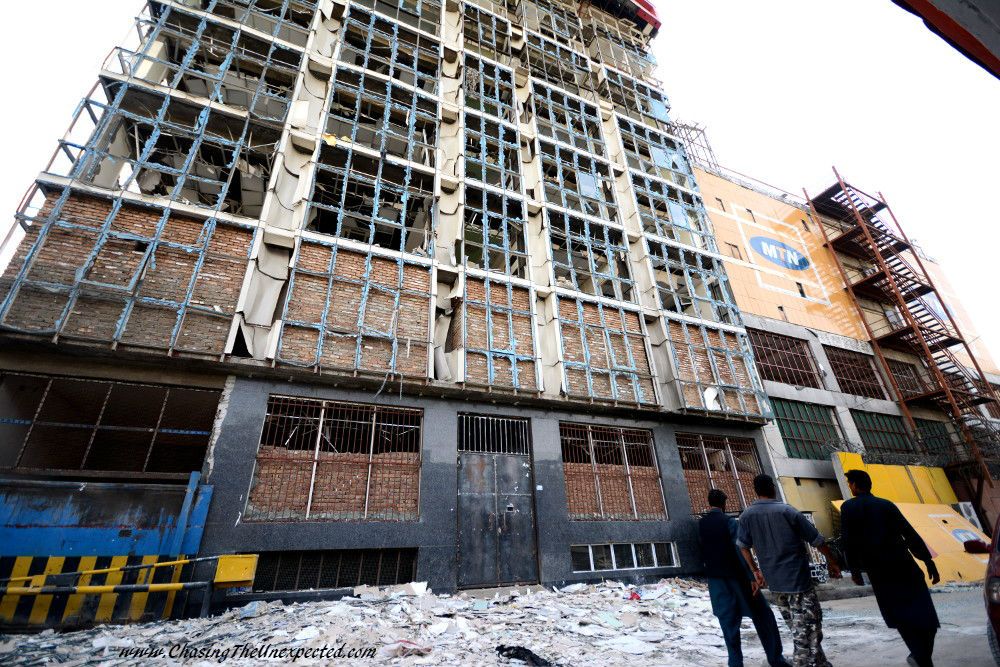
The shattered facade of the building where NGO CARE International was attacked by a Taliban commando for 11 hours until Afghan Special Forces managed to end the terrorist raid.
Even though Kabul is slightly more relaxed than Herat when it comes to women’s dress code (in the capital I could avoid wearing the chador), it’s also one of the most dangerous cities for terrorism and attacks. Walking the streets of Kabul you can hardly avoid the sight of war-torn buildings, potholed roads, and half-constructed buildings. The echo of the news of daily attacks hardly leaves you in Afghanistan, and I admit that sometimes, especially when we were in sensitive areas such as public offices, banks, or even shopping malls I would be afraid when someone would stop all of a sudden or look a little too “Taliban”.
One evening, after our daily wanderings, we were in our hotel in Kabul when my husband went down to fill our usual thermos of tea. After half an hour, he wasn’t back yet, and since our tea guy was just in front of the hotel, I started worrying. When he finally arrived, he nonchalantly gave me the news that the NDS, the Afghan Intelligence, had warned our reception that they were expecting an attack on the hotel behind ours, and that probably ours was going to be used as the springboard.
Even though we had been in Afghanistan already for a couple of months, this was not really the kind of news I could get used to easily. Apparently, my husband did, but he had been living all his life in Afghanistan, he had gone through the civil war after the Soviets pulled out, he had endured the five years of the Taliban regime, and witnessed the bombs of the Nato intervention in 2001, so I guess a “probable” attack wasn’t alarming enough to give up on his evening tea and dried figs.
In a couple of minutes, an entire movie flowed in the back of my mind and a sense of frustration pervaded my thoughts: we were finally able to go back to Italy and our plans were about to fall apart. I wanted to pack and leave, change hotels, go to any other place that was safer if there was any. Finally, my husband noticed my unease: “What are you, scared??” he asked me as if falling from the sky. “Don’t worry, these reports are common, we used to receive many every day in the base, but we were attacked no more than a couple of times a month!”
If that was supposed to calm me down, it wasn’t quite successful.
I traveled to Afghanistan knowing I could always leave the war zone and go back home, but for Afghans, it’s not that easy.
As hard as life in Afghanistan seemed to me, it was nothing compared to how difficult it is for an Afghan to get a Schengen visa for Europe. Even if the Afghan is married to an Italian.
Accessing a foreign embassy in Kabul is not quite like entering a consulate office in any of our cities in Europe. They are located inside a highly secure base and before being allowed to the little space devoted to the public, you are searched a couple of times, provided that you do have an appointment.
The first time we went, after introducing myself as an Italian, the security guards told me it was dangerous for me to wait outside, so I should enter the premises alone.
“What about my husband?” I asked.
“We don’t know him,” the inexperienced guard replied.
“But he’s my husband,” I said, “I’m not going anywhere if he’s staying outside.”
And then, his biggest mistake: “Maybe he’s your husband,” he replied. “Maybe not!”
This is when all my perfect-Afghan-wife pledges crumbled and I couldn’t help it but shift to a full Italian mode. I started roaring (probably a reaction the guard wasn’t expecting from a woman) until he ran back inside to come out a couple of seconds later to let us both in.
Afghanistan is one of those countries that sucks you in fully. Its tormented history, complicated society, disheveled kids, and the rugged population will give you a disconcerting range of mixed feelings. At times I wanted to leave, at times I felt like staying there for longer than planned. I was somewhat relieved when we finally boarded the plane back home, and now, after a year apart, I’m longing to go back.
This article originally appeared on Chasing the unexpected and is republished here with permission.
